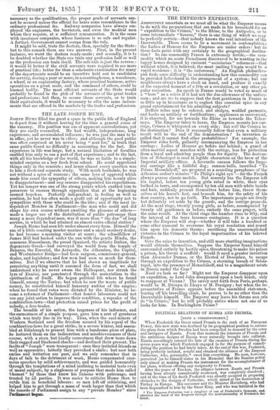THE LATE JOSEPH HUME.
Toms HumE filled too great a space in the public life of England to depart from it without leaving for the time a general sense of the vacancy. His position was one of apparent contradictions, yet they are easily reconciled. He had wealth, independence, long experience, and accumulated influence; he was just the man to be in office, yet he never was in office ; and although the good public was often surprised at his never being " sent for," in truth that same public found no difficulty in accounting for the fact. His experience in life was large, but a natural limitation of faculties enabled him only to use a part of that experience; and to the last, with all his knowledge of the world, he was as liable to a simple. minded surprise as a boy fresh from school. He could apprehend things only in the concrete; and hence almost every question was to him a fresh and separate study. With much bonhomie, he was not without a spice of rancour ; the same love of approval which made him court the sympathy of others, making him keenly alive to disappointment—and any censure disappointed his expectations. Yet his temper was one of the strong points which enabled him to persevere to success through opposition that at the beginning seemed hopeless. Perfectly independent, in feeling as well as position, he had too often made a profit out of opportunity not to sympathize with those who could do the like; and if the most in- dependent Member in Parliament—the man who could and did shape his own course without awaiting the pleasure of others— made a larger use of the distribution of public patronage than many a more dependent man, was it more than " the due" of long service, in which he had attained an almost extra-official station ?
Joseph Hume had seen life under almost every form. Himself the son of a little coasting master mariner and a small crockery dealer, he had become a morning visitor at court; the schoolfellow of James Mill had basked under the sun with the gentle Hindu, the sensuous Mussulman, the proud Spaniard, the artistic Italian, the degenerate Greek—had surveyed the world from the temple of Benares, the Escurial, the Acropolis, the Alhambra, the Capitol, and Westminster Bridge—had been surgeon, commissary-general, dealer, and legislator; and few men had seen so much for them- selves. But if we observe that he had shown an inaptitude for perceiving anything until it assumed the form of fact, we shall understand why he never swam the Hellespont, nor struck the lyre. of Ennius, nor penetrated through the materialism to the spiritualism of Budh. He began political life where he found himself, among the Tories; but when he saw the waste of public money, he constituted himself honorary auditor of the empire; when he found that votes were dictated by the Minister, he be- came a reformer of Parliament—that honest labourers could not use any joint 'action to improve their condition, a repealer of the combination-laws—that protection raised prices for the profit of nobody, a free-trader. , The breadth of his action, the largeness of his influence, and the earnestness of a, simple purpose, gave him a sort of greatness which was truly flue in its way.. Thus, when the coal-miners of Western Scotland used the freedom secured by his repeal of the combination-laws for a great strike, in a severe winter, and assem- bled at Edinburgh to present him with a handsome piece of plate, he lectured them on the indiscretion and mischievousness of their course, with .a stern but kindly earnestness that drew tears down their rugged and blackened cheeks—and declined their present. The faults of "Joseph " were transparent : once they irritated friends as well as opponents ; latterly they provoked a smile; but now both smiles and irritation are past, and we only remember that in days of talk to the detriment of work, Hume compensated enor- mous speeches by solid achievements, and was guided honourably through the temptations of a mind inclining to material tests even of moral subjects, by a singleness of purpose that made him called :honest" by those that knew his liaisons with patronage, and trusted by all parties. It was easier to criticize Hume than to outdo him in beneficial labours : so men left off criticizing, and helped him to get through a mass of work larger than that which the records of Parliament assign to any "private Member" since Parliament began.


































 Previous page
Previous page